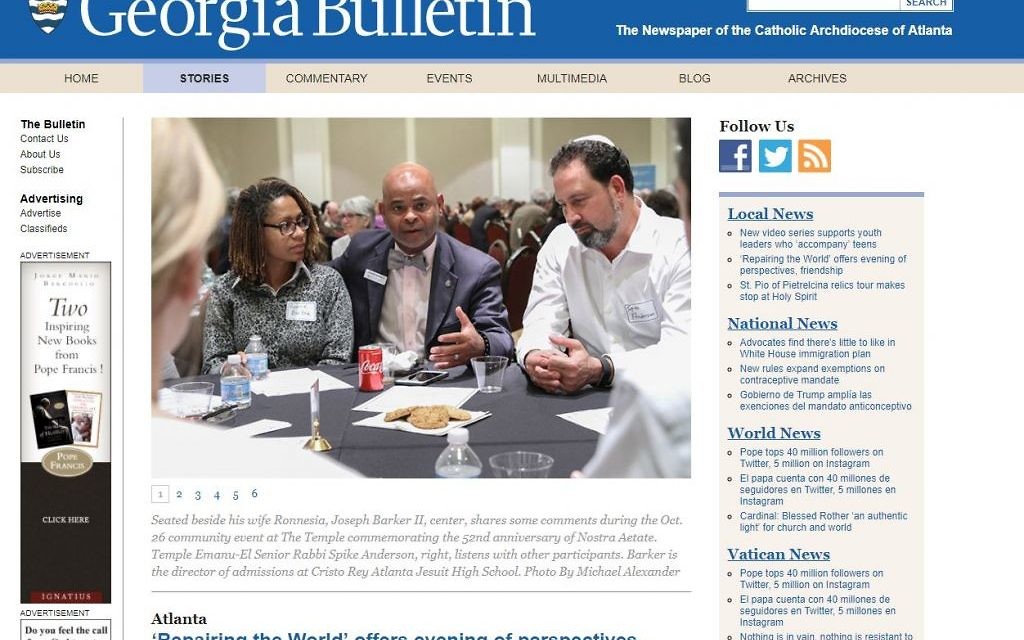Lack of Education Doesn’t Explain Anti-Semitism
For some, familiarity breeds friendship, but it's far from a cure-all for what ails us.

Education is the key to fighting anti-Semitism and other forms of discriminatory hate.
That’s what we’re always told, and that was one of the takeaway messages from the annual Catholic-Jewish event held by American Jewish Committee and the Archdiocese of Atlanta on Thursday night, Oct. 26, complete with an appropriate quotation from Martin Luther King Jr. to indicate the value of this common bit of wisdom.
The heart of the “Repairing the World: Understanding Our Shared Responsibility” event at The Temple was a discussion period within each table. Sure enough, education was touted as one of the key cures for prejudice and hate during the talk among the four Jews and four Catholics at my table.
Get The AJT Newsletter by email and never miss our top stories Free Sign Up
Hate melts away once people get to know each other. It’s ignorance — the kind that allows some Christians to grow up believing that Jews have horns and that prevents some Jews from recognizing that Catholics, Lutherans and Southern Baptists don’t see themselves as generic “Christians” who all get along — that leads people to rally under Klan and neo-Nazi banners and attack people with any differences.
In some cases, of course, that’s true. People in rural areas who have never met a Catholic, let alone a Jew or a Muslim, can allow their imaginations to run wild with all the worst stereotypes and wind up convinced that the unknown others are dangerous and worthy of hate.
For such people, those with some degree of isolation and homogeneity in their surroundings, education could indeed be the best medicine for the disease of hatred. “Look, no horns here, and don’t believe what you hear about weekly meetings of the global Jewish cabal. Our Control the World Media Committee gets together only once a year, and we spend most of the time complaining about what a bad investment newspapers are.”
But throughout our table discussion, I thought about the incidents of harassment and anti-Semitism involving a range of age groups at public and private schools in the Atlanta area. The culprits were young, but they probably couldn’t remember a time when they didn’t know and learn with Jews.
I kept thinking of Richard Spencer, the white separatist and supremacist who loves to chase headlines by holding lectures at public universities around the nation. Florida Gov. Rick Scott declared a state of emergency when Spencer recently spoke at the University of Florida, and his next target appears to be the University of Cincinnati (although not until after the Southern Jewish Historical Society holds its annual meeting in the city Nov. 3 to 5).
Spencer’s education includes the University of Virginia, the University of Chicago and Duke University, and he has lived and studied among many people different from him. For him, familiarity might not have bred contempt, but it certainly did not give birth to tolerance.
There’s no way to know how many Richard Spencers — people who seem immune to educational eye-opening — exist among the groups and individuals obsessed with hating others, but it’s wise to assume he’s not unique. For them, getting to know us doesn’t solve anything.
That mystery is at the root of my frustration with the annual Catholic-Jewish event, held in the spirit of Nostra Aetate (the Vatican document in 1965 that cleared the way for Catholic acceptance of Jews), and with other interfaith events. They’re wonderful opportunities for learning, for dialogue, for confronting society’s ills and for feeling good about ourselves for doing something.
But if education or familiarity is the key weapon against hate, how do we wield it? How do we reach beyond those open-minded enough to attend such events? And how do we explain Richard Spencer?




comments